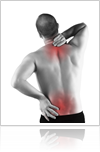Most car accident injuries are immediately apparent, such as lacerations and broken bones. Others may not result in symptoms until hours, days, or even weeks after the wreck. Your injury attorney in Baltimore needs to know about these late-appearing injuries so that he or she can provide effective legal advocacy services, and secure maximum compensation on your behalf.

Back Pain
Low back pain is particularly common among survivors of rear-end and side-impact car accidents. It might not develop right away, and it can become worse without treatment. It’s possible for the pain to be caused by damaged vertebrae, ligaments, or nerves, so talk to a doctor about your symptoms promptly.
Abdominal Pain
Pain or swelling of the abdominal area should receive emergency medical attention. This could indicate severe internal bleeding that may become life-threatening. Other accompanying symptoms may include extensive bruising on the area, dizziness, and fainting.
Neck Pain and Stiffness
Neck pain and stiffness, loss of range of motion, and headaches can indicate whiplash—a common late-appearing injury of rear-end car accident survivors. Without early treatment, it’s possible for whiplash to cause chronic symptoms. Other accompanying symptoms of whiplash may include blurry vision, tinnitus, dizziness, and muscle spasms, along with pain, numbness, and tingling that extends down the arms. Treating whiplash may involve multiple sessions with a chiropractor and/or a physical therapist. Your attorney can help you secure compensation for these medical expenses.
Headaches and Impaired Cognition
Never ignore any signs of possible head trauma or neurological impairment after a car wreck, such as headaches, memory loss, difficulty concentrating, and impaired reasoning. Traumatic brain injuries (TBIs) can develop even if your head wasn’t struck by something. The force of the impact can cause your brain to move back and forth within your skull, causing severe tissue damage. Other signs of brain trauma can include convulsions, nausea, vomiting, confusion, depression, irritability, and loss of balance. Some patients go on to suffer from long-term or permanent changes in personality and functional abilities.

